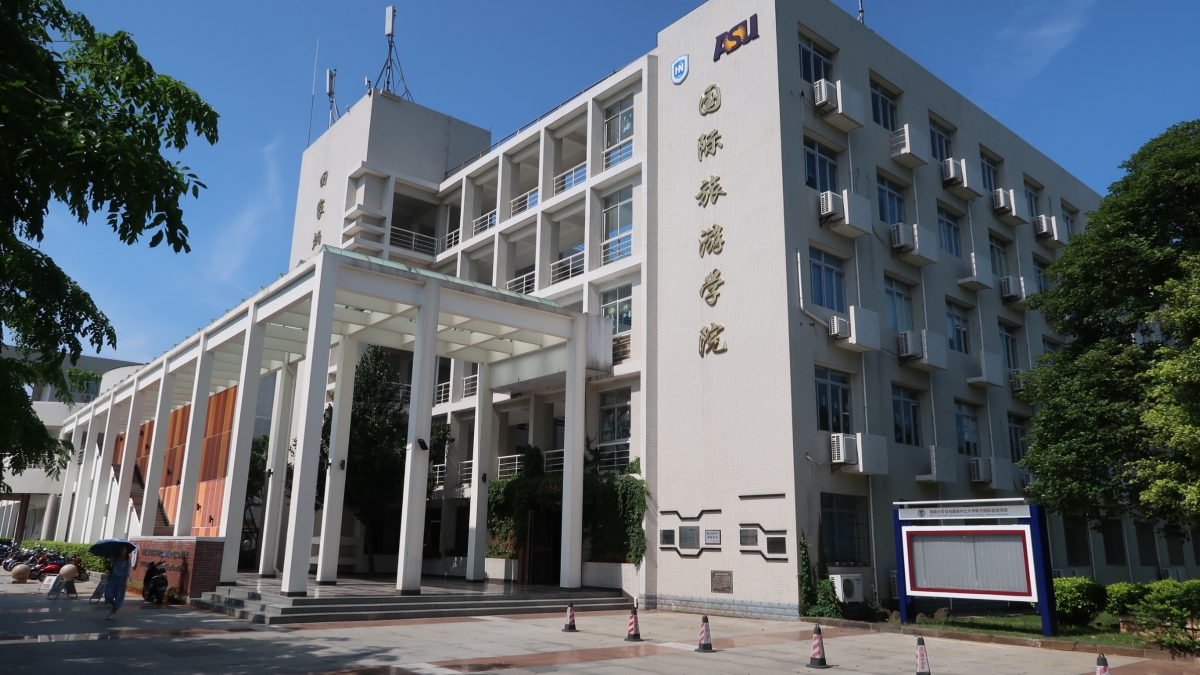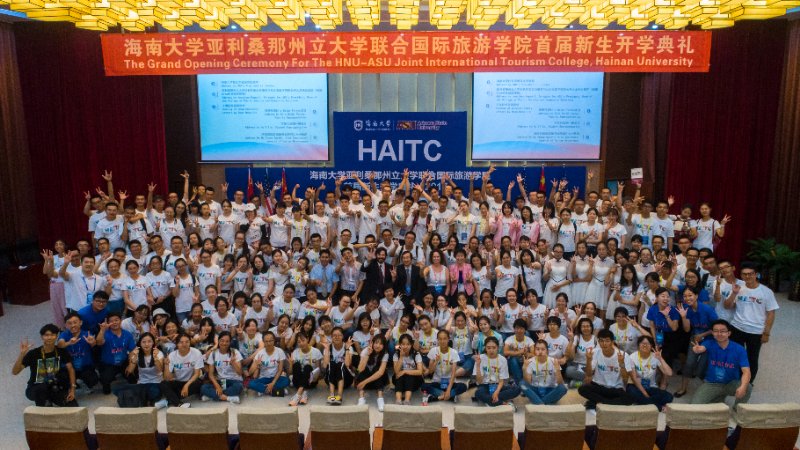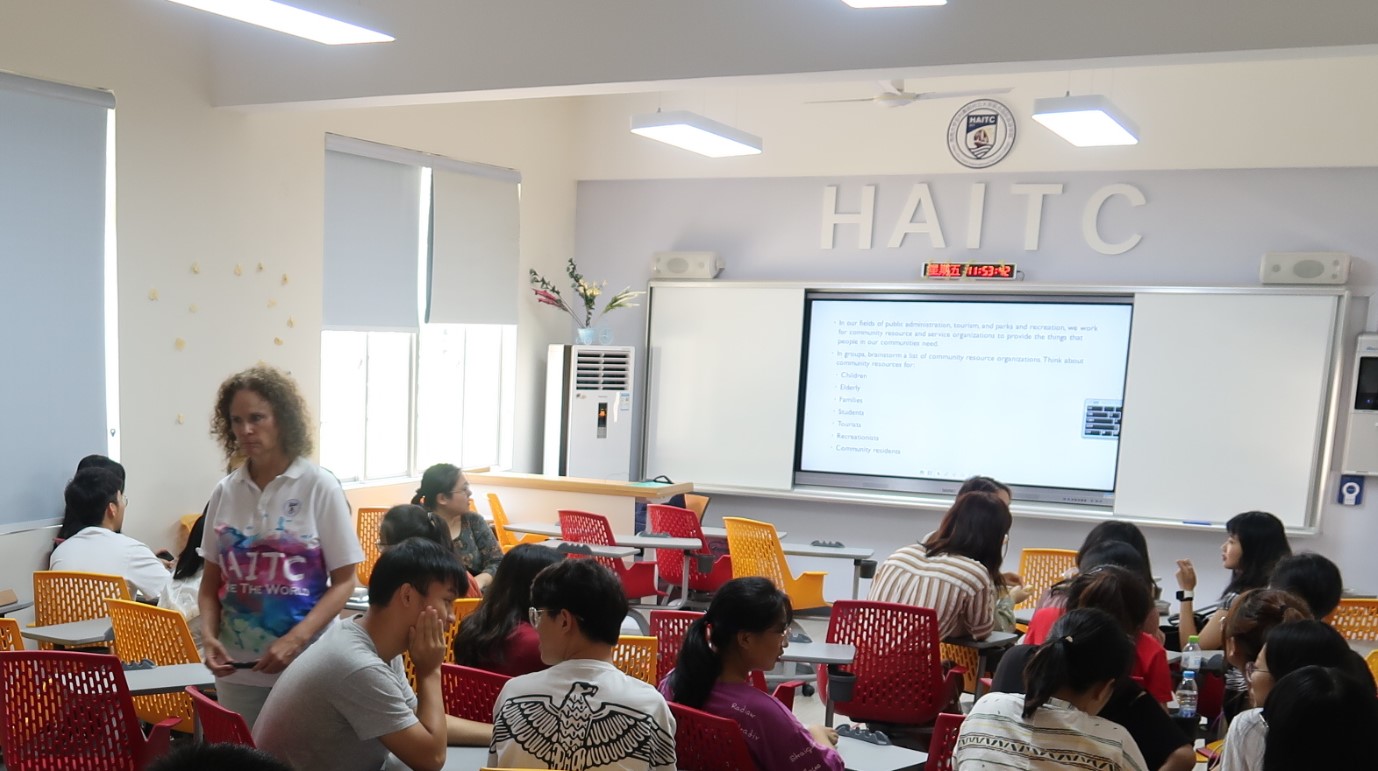ASU, Hainan University's joint tourism college graduates 1st class of students

More than 220 students will receive bachelor’s degrees this month from Hainan University-Arizona State University International Tourism College (HAITC) in the southern Chinese city of Haikou.
Eighteen more will follow in August, completing the first cohort of a program that began in 2017 when ASU’s Watts College of Public Service and Community Solutions teamed with Hainan University to grow the pipeline of trained professionals in the expanding fields of international tourism, parks and recreation, urban and rural planning and public service.
Members of each year’s cohort are fully admitted as ASU students with access to all ASU services.
Watts College Dean Jonathan Koppell said the graduation represents a triumph for ASU, HNU and international collaboration that fulfills the need for qualified graduates in growing fields.
“When we talk at Watts College about our desire to ‘be the solution,’ we know that effort will literally take us around the world,” Koppell said. “This partnership started with a shared desire to train a cohort of leaders who would guide tourism and recreation development with an eye toward community health, cultural sensitivity and long-term prosperity. Seeing this effort bear fruit is enormously gratifying for us and our partners at Hainan University.
“We appreciate the confidence the Chinese Ministry of Education placed in our team and look forward now to the expansion of HAITC to include additional degrees and learning opportunities,” Koppell said.
HAITC Director Kathleen Andereck (standing left) walks through a classroom at Hainan University in Haikou, China. ASU-HNU photo
Graduate Ziming Jin said the program offered an excellent opportunity to study parks and recreation management, but also to make great strides in self-improvement.
Jin will be coming to Arizona in the fall to begin studies at the School of Community Resources and Development toward a master’s degree.
“My English skills have advanced during the past four years of studies,” Jin said. “Based on the education model of ASU, I gained chances to participate in several research projects and made great success under them. I published an English-language article in (the journal) Anatolia (that was) advised by the ASU faculty. These remarkable experiences have helped me in finding a lifelong committed career goal as an academic.”
HAITC Director Kathleen Andereck said 240 of 261 students who began studies in fall 2017 will complete their degrees this year, a 92% graduation rate. Over 1,000 students are currently enrolled in the distinctive program.
“Our students earn two degrees, one from HNU and one from ASU, so they have worked extra hard to achieve their academic goals,” said Andereck, a School of Community Resources and Development professor.
Andereck said that so far, 97 students have been admitted to graduate schools at universities around the world, including the United States, China, Australia and the United Kingdom.
“We are proud of our students and know they will continue to be successful as they become professionals in their chosen fields,” Andereck said.
Four years at HAITC broadened Yuanxun Wei’s vision through exposure to instructors and classmates from several nations.
“I have gradually formed an international thinking and I knew how to appreciate and understand different cultures,” said Wei, whose degree is in tourism development and management. “Various activities and student interest groups organized by HAITC allow me to fully demonstrate my talents. At the same time, I have also improved my ability to cooperate and coordinate with others. We used our imagination and innovation to create many interesting designs. … I have gained a clearer understanding of my personal interests and future plans. In the future, I am going to the United States for postgraduate study and am ready to dive further in the field of tourism management.”

The first cohort of HAITC students in fall 2017 at Hainan University in Haikou, China. ASU-HNU photo
Students will receive bachelor’s degrees in one of three different degree programs.
Two degrees are in the School of Community Resources and Development. One hundred twenty-two students are graduating with degrees in tourism development and management, which is matched with Hainan’s hotel-management degree. About half of HAITC’s enrollment is in this degree program.
Sixty-eight are receiving degrees in parks and recreation management, which is paired with Hainan’s geography and urban and rural planning degree.
Fifty are receiving degrees in public service and public policy in ASU’s School of Public Affairs, matched with Hainan’s public administration degree.
Many students have won provincial and national awards, Andereck said.
Zongrui Liu, whose degree is in public service and public policy, gradually became familiar with the research methods used in the area of public policy, as well as in tourism and parks and recreation management.
“I will continue my graduate study in Northeastern University in the U.S. Besides, the program has offered me the opportunities to improve my English proficiency as well as volunteering activities in internships,” Liu said. “I have volunteered for the Boao Forum for Asia for two years and gained the chance to take an internship at Pan-Asian Life Insurance Company Hong Kong Branch and Xinhua E-Commerce in Beijing. So I appreciate what I have obtained from the HAITC program.”
The HAITC experience has helped Ziyuan Quian establish a more complete worldview.
“I can accept different cultures more tolerantly and have an international perspective to improve my competitiveness,” said Quian, whose degree is in public service and public policy. “These experiences helped me get admissions to the University of Sydney and the University of Melbourne. Thank you, HAITC, for giving me the opportunity to study.”
Commencement ceremonies will be held at the Hainan University campus in Haikou, capital of the island province of Hainan, just off the southern coast of China.
Top photo: The HAITC is housed in this building on the campus of Hainan University in Haikou, China.
More Arts, humanities and education

ASU professor's project helps students learn complex topics
One of Arizona State University’s top professors is using her signature research project to improve how college students learn science, technology, engineering, math and medicine.Micki Chi, who is a…

Award-winning playwright shares her scriptwriting process with ASU students
Actions speak louder than words. That’s why award-winning playwright Y York is workshopping her latest play, "Becoming Awesome," with actors at Arizona State University this week. “I want…

Exceeding great expectations in downtown Mesa
Anyone visiting downtown Mesa over the past couple of years has a lot to rave about: The bevy of restaurants, unique local shops, entertainment venues and inviting spaces that beg for attention from…


